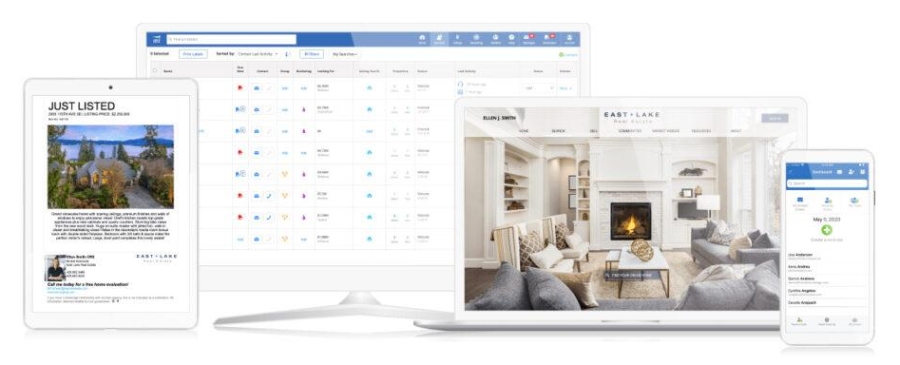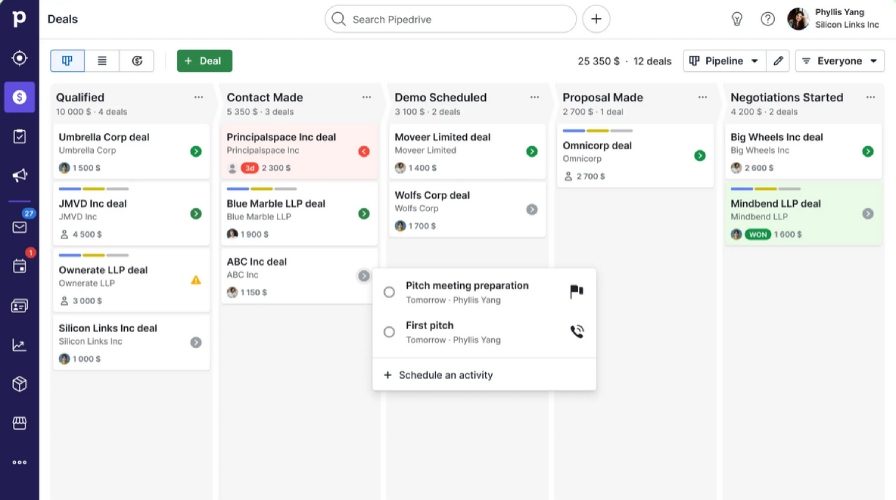According to Salary.com, in 2023, the median salary for a real estate agent in the United States is approximately $45,426—spanning from $44,376 to $57,781. However, the term “salary” is a misnomer in the real estate industry compared to how it describes earnings in other industries. Agents work as independent contractors, and how much the average real estate agent makes is based on factors like deal size, location, hours worked, years of experience, and operating expenses.
Here is a breakdown of average salaries for agents, how real estate agents make money, what impacts their salary, and tips to increase it:
What Is a Typical Real Estate Agent Salary?
A typical real estate agent’s salary can vary significantly based on location, experience, market conditions, and individual performance. It’s important to note that some agents earn much higher incomes through commissions on property sales, while others may earn lower amounts, especially when starting their careers. Earning commission-based income offers the potential for high earnings and variability based on market activity and an agent’s sales success.
Earnings also differ by specialty or additional side jobs. For example, a leasing agent may earn less than a full-time real estate agent. Other sources of income could include offering broker’s price opinions (BPOs) on behalf of a bank in foreclosure proceedings. Agents also earn referral fees when they refer clients to other agents. Residential and commercial real estate agents also can have widely different incomes.
Let’s compare a few of these based on average salary data:
The average salaries differ. Commercial sales may pay a higher commission, but they happen less frequently. Leasing agents often earn the equivalent of one month’s rent, but their closing time frame is usually shorter than selling a house. A leasing agent could close multiple deals in a day, which would bump their income.
Salary Differences Between Broker vs Realtor vs Real Estate Agent
In real estate, professionals hold different roles with varying earning potentials. Real estate agents facilitate property transactions and earn commissions averaging around $48,770 annually. On the other hand, Realtors are agents and brokers who belong to the National Association of Realtors (NAR) and benefit from added prestige and networking opportunities. In some instances, they can earn a higher income due to their affiliation.
Above agents are brokers with higher licensure, overseeing agent teams and earning a share of their commissions. Broker salaries vary widely based on team size and brokerage success. While specific broker earnings are challenging to pinpoint, their incomes generally surpass individual agents and realtors, making it an appealing path for maximizing financial rewards in the real estate industry.

Agent Essentials for current agents to grow their careers (Source: The CE Shop)
Being a real estate agent offers unlimited earning potential. Whether starting your real estate career or looking to increase your income, real estate schools like Colibri Real Estate or The CE Shop can help get you to your goals.
The CE Shop offers one of the most engaging and interactive online course platforms, the widest variety of prelicensing course packages, and continuing education topics. Online learning can take place almost anywhere and fit into almost any schedule, allowing you the freedom to scale your income from the convenience of home.
How Real Estate Agents Earn Money
When you’re seeking the answer to “how much money does a real estate agent make in an average year?,” it’s essential to understand that a real estate agent’s income depends on the size and frequency of commissions earned from their sales and leasing activity each year. Agents experience spikes and dips in their income rather than a steady stream of fixed wages so it can fluctuate annually, and the real estate market is a strong driver of wages.
Salaries can differ within the real estate industry.
Many agents split the sales commissions with their brokerage and other agents in what is referred to as a co-broke. To learn more about realtor commissions and calculate your commission splits, read our guide on how real estate commission splits work.
When it comes to how much money a real estate agent makes, much of your earnings depend on the brokerage split and fees, so research before choosing a brokerage to work for. Some brokerages use a 50% split model, while others offer a 90% to 100% split and cover their expenses by charging the agent fees.
Factors That Affect Real Estate Agent Salary
Real estate agent incomes vary across the country due to different factors. For example, how much real estate agents make in a year differs based on whether they work part time or full time, how experienced they are, or the cost of properties in the area. Agents with more experience and live where home values are higher tend to earn more.
Here is the breakdown of how these factors impact a real estate salary:
Agents who work more hours typically make more money. Many part-time agents may reduce the overall median real estate agent salary data. However, this is not always the case since it is only one factor. According to a 2023 McKissock Learning report, agents who worked 40 hours or less per week made between $43,889 and $113,000, and agents who worked over 60 hours per week made $172,325.
If you’re an agent who wants to earn a higher salary, you should consider factors beyond the hours you put into work. If you want to be a high earner and work fewer hours, your location, niche, the current market, your commission split, and your ability to close sales should be your primary focus—even if it means relocating.
The median experience levels show that 44% of Realtors with more than 16 years of experience are earning over $100,000. However, only 4% of agents with up to two years of experience earn that much. It’s interesting to compare the same data from 2021 and 2022.
Over that period, the percentage of agents with less than two years of experience earning under $10,000 decreased from 59% in 2021 to 57% in 2022. However, the top earners (over $100,000) with less than two years of experience also dropped from 5% to 4%.
In contrast, 39% of agents with over 16 years of experience earned more than $100,000 per year in 2021, compared to this 2022’s 44%. This demonstrates that while years of experience are a major factor in earning potential, other factors, such as the economy, real estate market, and job growth of the real estate sector, all play a role.
It’s also important to note in 2022 that experienced agents (over 16 years) got approximately 43% of their business from referrals and repeat clients, while agents with two or fewer years of experience got less than 1% of their business the same way.
Real estate referrals and repeat clients are the two best ways to grow a real estate business. These sources naturally increase with more extended experience. With a solid base of repeat business and referrals, you can spend less time, money, and effort on generating new leads to scale faster.
An agent’s location is one significant factor that impacts how much a real estate agent makes in a year. Generally, the higher home prices are in an area, the more money you’ll be able to earn in commissions. However, moving to an area with high home values isn’t beneficial to your real estate business if the location is already saturated with agents and has low homeownership percentages. It’s best to find a happy median between location and saturation.
For a better perspective on how much you can make as a real estate agent, consider the city and state population, employment data, home values, and the annual real estate agent salary data:
You can achieve real estate success with drive and effective strategies, but your income will be limited if you live in an area with low selling prices. According to Realtor.com, these are the top 10 cities positioned for real estate growth to consider in 2023:
Rank* | Metro | 2023 Sales Growth % y/y | 2023 Price Growth % y/y | Combined Growth |
|---|---|---|---|---|
1 | Hartford-West Hartford-East Hartford, Conn. | 6.5% | 8.5% | 15.0% |
2 | El Paso, Texas | 8.9% | 5.4% | 14.3% |
3 | Louisville/Jefferson County, Ky.-Ind. | 5.2% | 8.4% | 13.6% |
4 | Worcester, Mass.-Conn. | 2.5% | 10.6% | 13.1% |
5 | Buffalo-Cheektowaga-Niagara Falls, N.Y. | 6.3% | 6.0% | 12.3% |
6 | Augusta-Richmond County, Ga.-S.C. | 6.2% | 5.7% | 11.9% |
7 | Grand Rapids-Wyoming, Mich. | 1.6% | 10.0% | 11.6% |
8 | Columbia, S.C. | 7.7% | 3.6% | 11.3% |
9 | Chattanooga, Tenn.-Ga. | 2.9% | 8.2% | 11.1% |
10 | Toledo, Ohio | 4.2% | 6.7% | 10.9% |
United States | -14.1% | 5.4% | -8.7% | |
*Ranking is based on the combined yearly percentage growth in both home sales and prices expected in 2023 among the top 100 largest markets in the country per Realtor.com’s metro level housing forecast. Sales Growth y/y was used as a tiebreaker in cases of a tie. (Source: Realtor.com) | ||||
Read our article on the top five best and worst states to be a real estate agent for more guidance on choosing a location.
When you think about how much money a real estate agent makes, also factor in your business expenses and overhead and deduct them from your gross revenue. Real estate agents who earn higher commissions also may have higher expenses. The more money you invest in your success, the more you can make, but you want to create a business plan and include a balanced budget.
Operational expenses vary. Some expenses may be covered by your brokerage. Expenses may include:
- Multiple Listing Service (MLS)
- National, state, and local membership dues
- Business cards
- For sale, open house, and other signs
- Cellphone service
- Meals
- Postage and stationery
Set aside a portion of your gross revenue on marketing and lead generation to scale your business. Investing in growing your customer base can pay off tremendously down the line. It can take years to build a base of referrals and repeat clients, so spending money developing your pipeline can hasten the process.
Real estate agents have about $7,200 in business expenses. Today’s most considerable expense is their average $1,710 in automobile costs. Tracking your miles, vehicle maintenance, and other expenses is essential to get the correct real estate tax deductions.
Here’s a quick breakdown of general business expenses for real estate agents:
Business Expenses | Average Costs |
|---|---|
$19 for individual continuing education courses; $999 for prelicensing | |
Vehicle Expenses | $1,710 |
Website Creation & Maintenance | $100 setup fee; $350 monthly |
Free to over $1,000 | |
Desk Fees | $100 to $1,325 per month |
$100 to $1,000 per month | |
$50 to $500 per month | |
Advertising & Marketing | $20 per lead; $2,300 for online ad campaigns |
Real estate agents should set aside money in a marketing budget to invest in growing their customer base and expanding their reach. A well-planned marketing strategy can attract more leads and potential clients, increasing the chances of closing deals. By allocating funds to marketing efforts, agents can establish a solid online presence, engage with their target audience, and boost their income through increased visibility and successful lead generation.
Tips & Tools for Higher Income
Most people become real estate agents because they want freedom, flexibility, and unlimited earning potential. While it’s highly feasible, many agents are stuck overworking and underearning. Therefore, use the right strategies and tools to scale your business to attain income goals.
Focus your time and attention on effective lead generation, marketing, and growing relationships. Here are some tools to invest in to scale your business and income:
Lead Generation
Using real estate lead generation software, you can break into crowded markets with strategic and automated techniques. Lead generation software is a helpful tool for real estate agents. It makes it easier for them to find and connect with potential clients interested in buying or selling properties. The software handles tasks like sending emails and posting on social media, so agents have more time to focus on essential things.
Lead generation tools also help agents keep track of all the people they talk to and make sure no potential client slips through the cracks. With this software, agents can talk to people in a way that feels personal, increasing the chances of turning them into actual clients. Plus, the software gives agents helpful information about what’s working and not, so they can make smarter decisions to grow their business and make more money.

Professional for Agents platform (Source: Market Leader)
Market Leader caters to agents, teams, and brokerages with marketing and lead conversion tools. It offers lead generation through an IDX website, customer relationship management (CRM), marketing automation, and lead purchasing, ensuring a steady stream of inbound leads. A mobile app grants swift access to CRM data, emails, and prompt lead responses while on the move.
Marketing
Real estate marketing can be complex as you may feel overwhelmed by tasks like creating a website, writing blog posts, optimizing content for search engines, posting on social media, and making videos. Additionally, you must write emails, text messages, and mail real estate flyers and postcards. In reality, one individual cannot juggle all of it.
Marketing tools help real estate agents increase their visibility, build a strong reputation, and ultimately close more deals—contributing to higher earnings and success in the real estate business. Additionally, marketing tools help agents stay organized and keep track of their seller and buyer leads, ensuring every potential customer is noticed.

The Canva dashboard (Source: Canva)
Canva stands out as a top-tier graphic design platform. Utilize its drag-and-drop interface, extensive creative resources, and expertly crafted templates to craft a wide range of social media assets. Upgrading to a paid plan unlocks access to its social media content calendar and scheduling tool, enhancing your design and management capabilities.
To manage work overload, choose one or two marketing channels, automate everything you can, and build as you go. When your income grows, invest in productivity tools and hire a real estate assistant to manage them. Email marketing is one of the most cost-effective approaches. Check out our article, 9 Key Real Estate Email Marketing Tips & Statistics, to get started.
Client Relationship Management (CRM)
A real estate client relationship management (CRM) system organizes and centralizes client data, ensuring no leads slip through the cracks. With easy access to information, agents can provide personalized and timely interactions, strengthening customer relationships. CRM automation streamlines repetitive tasks like emails and follow-ups, saving valuable time.
Agents can track leads, sales, and marketing efforts, gaining valuable insights into their performance. Additionally, CRMs facilitate collaboration among team members, fostering a more efficient and coordinated workflow. By harnessing these advantages, real estate agents can boost productivity, close more deals, and achieve greater success in the competitive market.

The Pipedrive real estate CRM dashboard (Source: Pipedrive)
Check out Pipedrive to boost productivity and sales. It provides seamless automation, intuitive pipelines, and insightful reporting. Get started today and see how Pipedrive can help you close deals faster, nurture leads, and build lasting customer relationships. Take advantage of this opportunity to elevate your sales game and take your business to new heights.
For free CRM options, visit our article 8 Free Real Estate CRM Software 2023.
Frequently Asked Questions (FAQs)
Commercial real estate pays the most, especially in high-demand areas like major cities or near energy grids. It includes office buildings, industrial properties, and retail centers that have the potential to generate substantial income for real estate agents, depending on the location. However, commercial real estate often takes longer to sell, and fewer properties are available than residential real estate.
Real estate agents make the most money in areas with high property values and strong markets. Major cities, with thriving economies and housing demands, offer lucrative opportunities. Also, regions experiencing population growth, limited housing, and a competitive real estate market can produce higher commissions for agents.
Yes, some real estate agents can become millionaires through their successful careers. Property values also play a role. An agent can make more money with fewer sales in an area with high property values. Still, it takes experience, planning, and consistent effort.
Bottom Line
The real estate industry rewards hard work and experience, reflected in how much real estate agents can make a year. A career in real estate can be financially rewarding, with the potential for agents to earn substantial incomes, especially in high-demand markets and with luxury properties. However, success hinges on individual effort and adapting to market fluctuations.